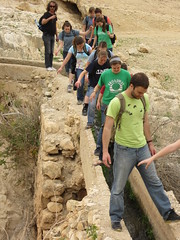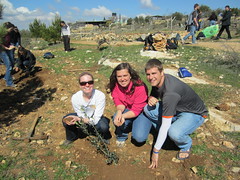It’s easy to say “tear down the walls!” It’s easy to say “we need peace!” It’s easy to say these things, but do people actually believe them? Do people want them for the correct reasons?
It’s really hard to listen to this man who doesn’t believe in the Palestinians. He isn’t the worst, he isn’t the most brainwashed, but when I live with the Palestinians and hear their stories I just cannot feel right about his words, his claims. He is not an inherently bad man and at least he doesn’t seem vindictive against the Palestinians. He is just for the Jewish people and Israel. It’s like…I can’t quite describe it… Oh I don’t know.
But I have a good feeling he is willing to do ANYTHING for the cause of Israel. And I’m glad to hear him saying that he is willing to live alongside the Palestinians, and I am glad to hear him saying he doesn’t always agree with the Israeli government or their military. But what does that really mean?
The Native Americans didn’t have any “official” claims to the land our families occupied except living there for as long as they can remember. Swimming in the James River. Hunting bison on the plains. Living in peace with nature in the West. Yes, our families hurt thousands, took their land, and left them with a paperclip and rubber band. But that wasn’t [us]. You cannot blame the people who are living now even if it is the face of past persecution.
We must learn from our mistakes instead of just blame each other for generations. We must break this cycle of colonization instead of being complacent within our roles of persecuted and persecutor. This is not much to ask for, but people are unwilling to open their eyes beyond what is in front of them, beyond their daily comfortable life.
We always need someone to blame. Someone to persecute for a scapegoat to get what we want. What would happen when the world becomes listeners instead of shouters?
I say when because I have hope. The world is not inherently bad because that’s calling the one who created us inherently bad. How we view the creation is how we treat the Creator. We don’t know how to see. We don’t know how to listen. We don’t know how to learn.
This may be the musings of a naïve twenty year old woman, but I am not incompetent. I am not uneducated. I have seen a lot during this month abroad. Not everything, but so much shoved into my head, through my eyes that I must know something. I must have some ideas. Something to offer.
I have a hope. A hope for this world. A hope for this society. It may be confusing, upsetting, destructive, crazy, chaotic, but I hope for this Earth. A hope for the humanity of this people. It’s there – it’s there in homeless shelters. It’s there in liberty in North Korea. It’s there in the Jesuit center in Jordan. We just need to open our eyes, or just need to get up off our faces and walk without bumping into our neighbor beside us. Without pushing our neighbor off this tightrope called life.
I really don’t have an answer, and I really do not think anyone does. We live our lives and in these lives we choose to be ignorant or too much in the way of positive production. When we see these injustices done to others, we want to help any way possible, but we do not have any clue how to do so. We have never experienced them ourselves. All we have is the motivation to help, but no knowledge on how to positively or effectively help.
And then we look at the perpetrator and cannot fathom or even begin to relate to that person. We don’t see anything more than a monstrous creature that holds a gun to its chest.
When I think about it…I think our goal as outsiders is to listen. To listen to the oppressed and the oppressors. They are both human and both subject to the same sins and justices we are subject to. It’s hard to do that when all you see are the injustices done to a people who have little effect when resisting the oppressors, who are subject to daily pain and suffering. But one thing we can do is that we have the opportunity to come to the other side not as the oppressed, but as listeners. As observers. As humans  connecting with each other despite difference of opinion.
connecting with each other despite difference of opinion.
We need to start spreading hope. Hope to everyone – to the oppressed and the oppressors, who are both deserving of God’s love.
So how are you going to help?
– Morgan Porter
February 25, 2012
After living and building friendships in Palestine for three and a half weeks, it was weird to tell them that I was leaving to go to a place that they can’t travel to. We may have only driven 15 minutes to get from Beit Sahour to Jerusalem but the landscape and the feeling has changed drastically. One of the most notable changes is the water issue. In Beit Sahour and Palestine, people had to be so conservative with their water use and now I walk down the street and see hoses laid under planks to help water plants and grass and it seems like water is in abundance, but a couple of miles away it is scarce.
During the past three and a half weeks, we heard several emotional lectures and visited places affected by occupation every day. We have gone to places like a refugee camp and a Palestinian farm that is continually faced with demolition threats from the Israeli army. Sometimes it is hard to listen to emotional stories because of the human rights violations that occurred. One day we visited a place called Tent of Nations, which is a farm owned by a Palestinian, that grows grapes,  almond trees and olive trees. The olive trees are seen as a sign of hope for the Palestinians because they don’t produce olives for seven to ten years, so when you plant it you have to hope that you will see the end product. A couple of days after we visited it, we found out that the Israeli army issued a warning towards them, saying that they would demolish some of the property unless action was to be taken in court in the next 45 days. This is frustrating because they have already gone to court several times to prove that the land is legally theirs.
almond trees and olive trees. The olive trees are seen as a sign of hope for the Palestinians because they don’t produce olives for seven to ten years, so when you plant it you have to hope that you will see the end product. A couple of days after we visited it, we found out that the Israeli army issued a warning towards them, saying that they would demolish some of the property unless action was to be taken in court in the next 45 days. This is frustrating because they have already gone to court several times to prove that the land is legally theirs.
One of the most difficult days was the day we visited Ephrat, a Jewish settlement. This was the second settler we heard talk about occupation from their perspective. It was difficult because we tried to ask him objective questions but he would usually respond with an example about America. One highlight I will take out of Palestine was our second to last day in Beit Sahour. After our afternoon session, a group of us went to play soccer at a local school. Some kids saw us with a ball and asked if they could join us. We started off by playing against the kids as a group but after they started to double us in size, we decided to split up teams and we ended by playing for two hours. It was so neat to lose all language and situational barriers and just interact with the kids. It was sad to have to say goodbye to a community that we had been so connected to, but I look forward to sharing all of my experiences there.
-Mike Ferguson
